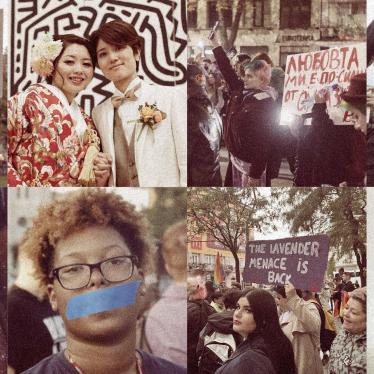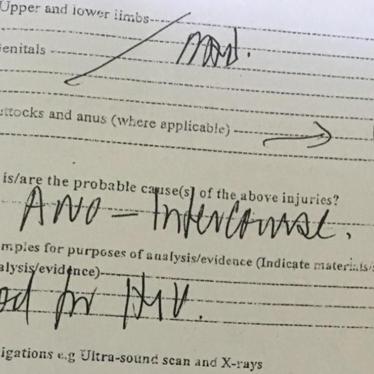In a stunning development for the principles of the Universal Declaration of Human Rights, at the United Nations Human Rights Council (UNHRC) in Geneva, today, Colombia delivered a Joint Statement during General Debate (Agenda Item 8 - Follow-up and implementation of the Vienna Declaration and Program of Action) that called on States to end violence, criminal sanctions and related human rights violations based on sexual orientation and gender identity, and urged the Human Rights Council to address these important human rights issues. The statement was delivered on behalf of a broad grouping of 85 States from all regions of the world.
Today's statement enjoyed the support of the largest group of countries to-date, on the topic of sexual orientation, gender identity and human rights. It builds on a similar statement delivered by Norway at the Human Rights Council in 2006 (on behalf of 54 States), and a joint statement delivered by Argentina at the General Assembly in 2008 (on behalf of 66 States). It is clear that every time these issues are addressed there is measurable increase in state support.
During the same general debate, an intervention delivered by Nigeria on behalf of the African Group, still reaffirmed the critical point that "laws that criminalize sexual orientation should be expunged". Other UN Member States and entities, for example, the Russian Federation and the Holy See, also spoke out against violence and discrimination on the basis of sexual orientation. South Africa, a signatory to the State joint statement, emphasized in a separate intervention, that sexual orientation is not a new issue for that country, and called for an inter-governmental process to ensure open dialogue on the issue.
Earlier in this 16th session of the Human Rights Council, the UN High Commissioner for Human Rights, Navanethem Pillay, had stated to the Council:[1]
"We are not trying to create new or special rights. We are simply trying to address the challenges that prevent millions of people from enjoying the same human rights as their fellow human beings just because they happen to be lesbian, gay, bisexual or transgender."
A powerful civil society statement was delivered on behalf of 119 organizations from over 60 countries welcoming the Joint Statement. Civil society also encouraged future dialogue within the Council, with the support of those States which did not yet feel able to join the statement, but which share the concern of the international community at these systemic human rights abuses. They also reiterated that the Council cannot refuse to address or discuss human rights violations against any individuals.
A group of 19 National Human Rights Institutions, including those from Korea, Senegal and South Africa, also delivered a strong statement on the importance of condemning human rights abuses based on sexual orientation and gender identity. These institutions are important for addressing the human rights violations - including investigating complaints, reviewing laws and policies, holding national inquiries and public education - to better protect and promote the rights of LGBTI people.
The Joint Statement supports what UN human rights bodies have repeatedly expressed: that no one should face rights violations because of their sexual orientation and gender identity. Since the UN Human Rights Committee's landmark decision in 1994, affirming that sexual orientation is a protected ground against discrimination, United Nations experts have repeatedly acted against abuses that target LGBT people, including killings, torture, rape, violence, disappearances, and discrimination in many areas of life. UN treaty bodies have called on states to end discrimination in law and policy. The Human Rights Committee monitors State Parties' compliance with the International Covenant on Civil and Political Rights.
Signatories to the Human Rights Council joint statement include: Albania, Andorra, Argentina, Armenia, Australia, Austria, Belgium, Bolivia, Bosnia-Herzegovina, Brazil, Bulgaria, Canada, Central African Republic, Chile, Colombia, Costa Rica, Croatia, Cuba, Cyprus, Czech Republic, Denmark, Dominica, Dominican Republic, Ecuador, El Salvador, Estonia, Fiji, Finland, France, Georgia, Germany, Greece, Guatemala, Honduras, Hungary, Iceland, Ireland, Israel, Italy, Japan, Latvia, Liechtenstein, Lithuania, Luxembourg, Malta, Marshall Islands, Mexico, Micronesia, Monaco, Mongolia, Montenegro, Nauru, Nepal, Netherlands, New Zealand, Nicaragua, Norway, Palau, Panama, Paraguay, Poland, Portugal, Romania, Rwanda, Samoa, San Marino, Serbia, Seychelles, Sierra Leone, Slovakia, Slovenia, South Africa, Spain, Sweden, Switzerland, Thailand, Timor-Leste, Tuvalu, Ukraine, United Kingdom of Great Britain and Northern Ireland, United States of America, Uruguay, Vanuatu, Venezuela, and the Former Yugoslav Republic of Macedonia.
[1] Interactive Dialogue with the UN High Commissioner for Human Rights, Navi Pillay, Item 3, 16th session of the HRC.







